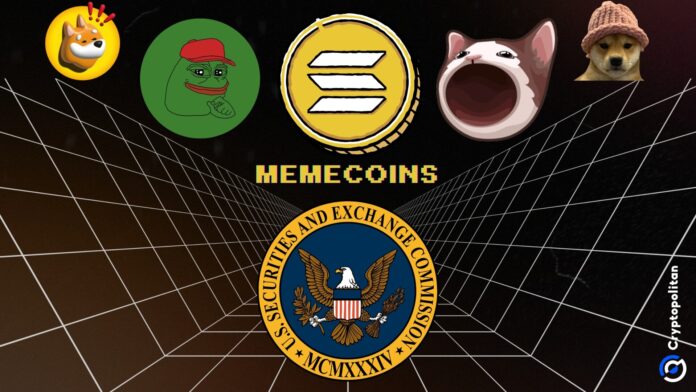Jai Hamid
The SEC’s chokehold on the crypto industry is getting backlash from every corner. Internet personality Nic Carter didn’t hold back when he jumped on a post by Omid Malekan, a Columbia Business School professor, who argued that the SEC’s policies are driving people into meme coins.
Carter backed this up, saying that the so-called “oppressive SEC regime” is responsible for the hype and speculation frenzy around meme coins. Without the SEC’s constant hammering, he believes, the market wouldn’t be driven to hype-driven assets like these.
Memecoins: A symbol of economic protest?
Malekan had said that a potential Trump win or Republican sweep—which betting site Polymarket places at 50%—would kill meme coins. He sees these coins as a kind of “economic populism,” standing against shady VC-backed coins that insiders run.
“Memecoins are a form of economic populism,” Malekan wrote, adding that they’re a reaction to the “toxicity of the Gensler/Warren regime,” forcing coins to go rogue. He listed out why the current regime’s endless geo-blocks, VPN bans, and regulatory crackdowns make meme coins thrive as protest symbols.
He says that a Republican win would bring back ICOs, global airdrops, and tokens with “sanity,” and that kind of realignment would tank meme coin mania.
Malekan laid it out like this: meme coins aren’t just mindless hype; they’re a way for regular investors to push back against the “grifty tokenomics” of VC-controlled coins. These venture-backed tokens, according to Malekan, are basically shoved into the market because of the SEC’s heavy hand.
All the blocks and restrictions? They’re the result of what he calls a “Gensler/Warren regime,” the driving force making meme coins attractive by default.
So, if a Republican sweep happens, Malekan claims the scene will change. He says it would roll back the geo-blocks, end the VPN bans, and welcome back ICOs and airdrops for everyone—not just those who can find a loophole.
Malekan argues that this kind of shift would refocus crypto on decentralized apps (dApps) and other projects that actually offer real use, unlike meme coins.
According to him, these changes would also bring back fee switches and dividends, mechanisms that return real value to holders instead of just hype, which would leave meme coins in the dust. If the regulatory chaos eases, he thinks meme coins could be looking at a long, cold bear market.
But Nic Carter had a simpler take. He quoted Malekan’s post and cut straight to the chase, saying, “Memecoins = in large part reaction to oppressive SEC regime. If the SEC finds sanity, less desire/need to trade memecoins.”
Carter added that meme coins aren’t going anywhere entirely, saying, “there will always be some baseline desire to trade memecoins as there has been for the last decade.”
Crypto community hits back
Of course Carter’s comment set off a chain reaction. Meme coin analyst Murad wasn’t convinced and didn’t think meme coins care about political winds or the SEC. “99% of memecoin buyers couldn’t care less about politics,” he shot back.
To him, the popularity of meme coins has way more to do with the “persistently rising Global Money Supply.” A booming money supply, Murad argues, means more cash floating around, which people will eventually push into high-risk assets like meme coins.
He said most people buying meme coins don’t even care about real projects with “legit revenues” or fee switches. They’re here for one thing: to catch a moonshot. According to him, if crypto shifted towards projects that mimic equity trading—dividends, fee switches, all that serious finance stuff—it would actually kill a chunk of the market.
“No one comes to crypto because they want to trade equities,” Murad argued, saying people come here “to find Parabolas,” a.k.a. the wild price spikes meme coins offer.
With global money supply on the rise, he predicts “the importance of Attention will increasingly predominate over Fundamentals and Cashflows.” That road, Murad says, “only goes one way.”
And then there’s Kook, who gave no room for subtlety. He told Carter flat out, “you are wrong / see a doctor (cope overload).” According to Kook, meme coins are just “fast fun hyper gambling,” which he sees as a perfect fit for crypto. In his view, they’re the product-market fit (PMF) crypto’s been looking for, and regulation changes won’t stop that.
The SEC’s heavy-handed approach and crypto’s frustration
Over the past year, Gary Gensler’s SEC has ramped up enforcement, particularly after disasters like the FTX and Terra collapses. The SEC leans heavily on the Howey Test to decide what’s a security.
If an asset involves people pooling money with an expectation of profit off someone else’s efforts, the SEC wants control. This year alone, the SEC pushed through 46 crypto-related enforcement actions, a 53% jump from 2022, hitting the big players hard.
Coinbase and Binance faced lawsuits for allegedly running unregistered exchanges, and Ripple Labs’ XRP got caught in a back-and-forth that classified it as a security when sold to institutions but not when sold to individual traders.
Kraken also got slapped with a $30 million fine for offering an unregistered staking program, and was forced to end staking services for U.S. users.
Gensler’s been vocal about why he thinks the clampdown is necessary. He sees crypto as a breeding ground for fraud, arguing that the existing laws apply just fine to this “new tech.”
The crypto industry isn’t taking all this lying down. Companies and advocacy groups are pushing back, going to court to limit the SEC’s power.
The Crypto Freedom Alliance of Texas has been at the forefront, arguing that certain digital assets aren’t securities at all, hoping to set legal precedents that curb the SEC’s reach.
Industry leaders like Brian Armstrong, Brad Garlinghouse, and the Winklevoss twins are demanding clear legislation to replace the current guessing game of SEC enforcement. They argue that a legal framework is the only way forward, not surprise crackdowns that make up the rules as they go.
